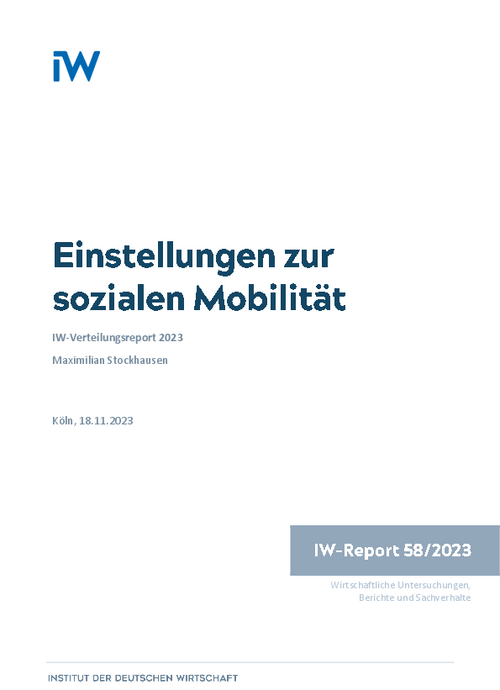Fundamentally linked to the social market economy is the idea that everyone has the opportunity for social advancement, regardless of their social background, and that children should be better off than their parents.

IW Distribution Report 2023: Attitudes towards social mobility

Fundamentally linked to the social market economy is the idea that everyone has the opportunity for social advancement, regardless of their social background, and that children should be better off than their parents.
Data from the German Socio-Economic Panel for 2021 allows for the first time an up-to-date analysis of subjective perceptions and attitudes towards social mobility in Germany. It shows that a clear majority of 84 per cent of parents surveyed expect their own children to be just as well off (36 per cent) or better off (48 per cent) at the same age in the future. Furthermore, young people are more optimistic about their own future prospects than older people. Among the population as a whole, the statement that effort and hard work are essential for actual success and social advancement is particularly well received: around 37 per cent of respondents fully agree with the statement, while a further 52 per cent somewhat agree. Other factors such as family background, gender and toughness towards others play a subordinate role in the perception of factors for advancement. Overall, social advancement is seen as something over which one has a great deal of control.
Furthermore, the difficulties encountered in collecting data during the coronavirus pandemic are broadly discussed. Together with additional changes in various data sources the available data severely limits a description of income changes in the years 2020 and 2021. This makes it difficult to understand how income inequality has actually changed during the coronavirus pandemic and to what extent the extensive financial aid and relief packages from the German government have relieved the burden on private households. Due to the data limitations, it will not be possible to shed light on this blind spot retrospectively. Nevertheless, the available results from the Microcensus for 2022 indicate a largely stable income distribution compared to the years before 2020. In addition, a convergence of low-income rates between eastern and western Germany can be observed in 2022, which might be due to the favourable labour market development and a significantly decrease in the low-income rate in eastern Germany since 2015.

IW Distribution Report 2023: Attitudes towards social mobility

More on the topic

A Focus on the Middle Class - Demarcation, Development and Mobility
In 2018, roughly every second German was a member of the middle class as measured by income, a proportion which has barely changed for more than a decade. However, the lower income threshold of this middle-income group has risen - an indication of increased ...
IW
The Minimum Wage and Income Poverty
There are currently loud calls for an increase in the minimum wage to 12 euros to ensure that it adequately covers the cost of living. However, the net income of a single person working full-time at the present minimum wage is already very close to the ...
IW